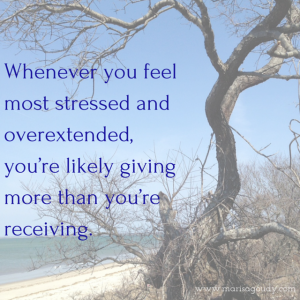
BLOG
5 Reasons to Quit Curating Content and Just Get Writing
 Content curation seems like an easy way to boost your online visibility and prove you're a useful, fascinating resource.
You pull together ideas from lots of smart people and then weave them together with a common thread plucked from your own life and work. You publish and share. You tag both the new and established content creators who are featured in your piece. Take the weekend off and start it all over again on Monday.
Content curation seems like an easy way to boost your online visibility and prove you're a useful, fascinating resource.
You pull together ideas from lots of smart people and then weave them together with a common thread plucked from your own life and work. You publish and share. You tag both the new and established content creators who are featured in your piece. Take the weekend off and start it all over again on Monday.
I took it on good authority that this whole curated newsletter thing was a low sweat way to build credibility. And grow a list.
5 Myths and Truths About Content Curation for the Creative Entrepreneur
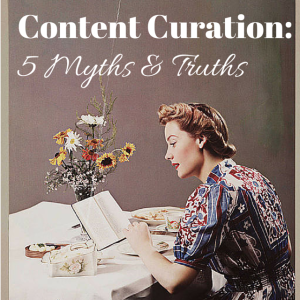 This list is based on ten weeks’ experience of research and writing about 15,00 words. Is this enough time to be an expert in the field of curated newsletters? No, but I am an authority on the Sovereign Standard and my own definition of what it means to be a successful creative entrepreneur.
This list is based on ten weeks’ experience of research and writing about 15,00 words. Is this enough time to be an expert in the field of curated newsletters? No, but I am an authority on the Sovereign Standard and my own definition of what it means to be a successful creative entrepreneur.
My intention is to give you some insights from inside a content curation project because there’s a lot of good press about it out there.
Truth is, you might just be better off writing rather than curating. I’m pretty sure I am...
Myth #1: Content Curation is Quick and Easy
The Hope: Curating others’ content would be easier and faster than writing my own post/newsletter each week.
The Truth: Weaving together other people’s posts and interviews often took more time than just writing and organizing my own ideas. Though I started with three set categories (livelihood, message, and everyday creative magic) and intended to share a couple of posts for each, I quickly rejected what felt like an overly simplistic system and wrapped all the ideas together in prose. (Lots and lots of prose...)
Outcome: I was producing long, “heady” posts each week that were well-made but ultimately too much for the majority of my readers.
Myth #2: Content Curation Makes You Smarter
Hope: I would read more widely and with more focused attention.
The Truth: I stopped reading things for pleasure or personal growth and would scan only for Sovereign Standard-related ideas. It’s likely I missed out on the best stuff because I was preoccupied with my agenda - my topic of the week.
Outcome: Reading others’ content became a chore. And, for brief and terrible periods, I started playing Two Dots or Candy Crush to avoid it.
Myth #3: Content Curation Encourages People to Share the Posts
Hope: Content creators would be so happy to appear in the Sovereign Standard that they’d jump on my list and share the posts with enthusiasm.
The Truth: Some people were awesome about this. Heck, Margaret Atwood tweeted at me and must have visited my blog (because she thought I misread her poem, but still…)! For the most part, however, there wasn’t any detectable bounce from all my dedicated linking and tagging.
Outcome: Over this ten week period I was producing two posts a week. The post that was all “mine” and more directly related to writing advice was just as likely to be shared as the Sovereign Standard piece.
Myth # 4: If It’s a Good Idea, It’s Worthy of Content Curation
Hope: Great posts related to the week’s topic would be easy to share and link to.
The Truth: The Sovereign Standard is about setting one’s own standards. Everything that was included in an issue had to meet my own (rather exacting) standards. As a writing coach with extensive website creation experience, I size up the effectiveness and quality of a site in about three seconds flat. I had to reject lots of content related to my weekly topic because I didn’t think the post or the site worked overall. If the post didn’t include a clear call to action or the website left me wondering “what does this person actually do?” I couldn’t include it.
Outcome: I did identify some potential clients and I became certain that people need my help when it comes to clarifying their message and presenting it through clear website copy. (Yes, this ultimately is a win, but it never made assembling the Standard any easier!)
Myth #5: Content Curation Frees Me to Focus on My Own Creative Projects
Hope: As in point #1, I was seeking a quick and easy route to visibility because I have a novel to write (and children to mother and a husband to love and clients to serve).
The Truth: Because content creation didn’t really feel like mine (even though I was expending loads of creative energy as I tied all those ideas and sources together), I felt compelled to write a second blog post each week that explored my signature idea - Writing to Sovereignty. The novel? I’d be lucky if I made few notes while nursing or hanging at the playground. Those two blog pieces took all my writing and production mojo.
Outcome: I started to feel like a fraud calling myself an “author” when I hadn’t typed a word of fiction since launching this curated newsletter. I was starting to resent whomever had appropriated my creative fire… and I realized it was me.
Still Curating, Still Sending a Newsletter, Just Not a Curated Newsletter
When it comes down to it, there is nothing wrong with content curation. I’ll never actually stop doing it.
After all, every time you share something you’re a “curator.” And linking to other people’s posts is a longstanding tenet of blogging that deserves to be preserved.
The problem was the way that I went about it. I lavished time and attention I didn’t really have on a project that wasn’t giving back what I was putting in.
The hope was to create something credible and substantial. The truth was, I believed that no one would be interested in what Marisa Goudy had to say about writing, entrepreneurship, and creativity, so I decided to share the spotlight with other creatives (many of whom hadn’t asked for the privilege).
I was afraid to stand Sovereign.
I’m grateful for this 10 week journey - for all that it has taught me and for managing to fail quickly (to borrow Chris Brogan’s line). I’m taking this opportunity to reset my course so I can tell my own Sovereign Story and offer you, dear reader, something useful that will help you identify your own.
Focus On What Actually Builds Visibility & Brings in Clients
What will change about the Sovereign Standard? Even my most loyal readers may barely notice.
The important thing is that I am shedding a term that became heavy and restrictive for me. I wanted “curated” to be a container that helped me shape my thoughts easily each week. Instead, I was perpetually over-delivering (in ways that didn’t add tangible value to readers or boost my business) because that container was never the right size or shape.
Likely I’ll end up blogging on my own site once a week and focusing on guest posting (please go read my essay about grief, motherhood, and a crazy dog on Suzi Banks Baum's Laundry Line Divine).
Most importantly, I’ll be making my foundational website copy absolutely perfect so no one ever says “I love your work! But… what exactly do you do?”
Need help focusing in on what writing projects are really important to building your business? Let's set up a free initial consultation.
What Makes a Story Meaningful for Entrepreneurs and Creatives (and the people listening too)?
The Sovereign Standard, Issue 10
“Your story.”
What does that mean to you?
Is it the glittering through line that makes you who you are?
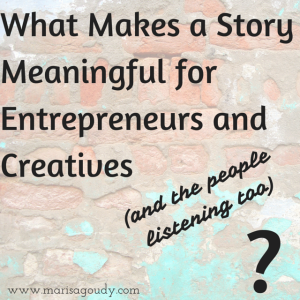 Or is it self serving? Is it the verbal unpacking of a lifetime’s baggage?
Or is it self serving? Is it the verbal unpacking of a lifetime’s baggage?
Is it something you’re meant to explore and expand?Is it something you’re supposed to expunge and escape?
What belongs in your story?
Is your story autobiographical, or is it that novel shored up inside you?
Are all stories created equal? Is fact worth more than fiction, or vice versa? And what about that gray place in between where you feel you have the most to say?
And do you have an obligation to your story?
Must you tell it for yourself, your ancestors, your children so everyone understands something about your line and legacy?
Must you tell it for an unknown reader who may be inspired, transformed, even saved because your narrative assures them they’re not alone?
The Sovereign Standard is dedicated to inspiring fresh questions rather than churning out "shoulds" and one size fits all answers. This week, let’s focus on helping you set your own Sovereign Standard by asking what makes a meaningful story.
Your Story: Personal. Creative. Professional.
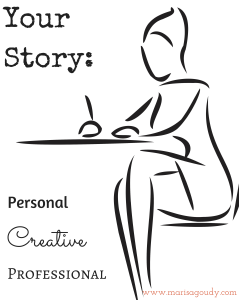 I believe that your story is important. More than an account of “this happened” and then “that happened,” your story is an interweaving of the personal, professional, and creative. And, depending on your disposition, you may agree that it has a spiritual dimension as well.
I believe that your story is important. More than an account of “this happened” and then “that happened,” your story is an interweaving of the personal, professional, and creative. And, depending on your disposition, you may agree that it has a spiritual dimension as well.
Telling your story is important on a personal level because exploring the events, relationships, and dreams that carried you to this moment helps you understand what you really want from the present and the future.
You need to develop your story to feed yourself at the creative level too. Not just so you can make art or create compelling content, but because exercising your creative abilities enables to you to solve business problems and meet all of your life with greater flexibility and joy.
Your story is important professionally because running a business is never just about business… at least not if you’re a creative entrepreneur. All your “stuff” will come up as you deal with financial pressures, difficult people, and the press to be a success (however you define that).
That’s the crux of business writing that goes beyond blogging: when you explore and develop your own story and your brand’s story, your able to define "success" and understand the work you’re truly meant to do.
And your story matters to those who will hear it or read it.
We know that memoir has become a wildly popular art form in the last few years. Is it because we’re just a bunch of voyeurs? No, we can just go to People magazine for that.
Instead, we want to understand the alchemical process of living through a first hand account. We want to know how others have faced adversity, climbed great heights, and experienced everyday life with a level of magic and grace.
On Being a Student of Story
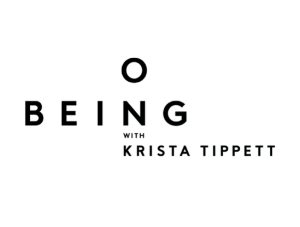 During a recent car ride I had a chance to meander through Krista Tippet’s On Being podcast library. Each conversation was rooted in story, even though each guest described vastly different experiences and perspectives.
During a recent car ride I had a chance to meander through Krista Tippet’s On Being podcast library. Each conversation was rooted in story, even though each guest described vastly different experiences and perspectives.
I invite you to savor these samples and dive deeper into whichever story calls to you. Below you'll find how the wisdom an activist, musician, and poet might help your transform how you perceive and share own story.
Stories That Empower, Stories that Don’t
Some stories do limit us, sustaining our victimhood through a tired recitation of how we’ve been done wrong. But other stories actually secure our sovereignty by uplifting both the teller and the audience.
Nathan Schneider, a voice for the Millennial generation who has published a book on God and another book on the Occupy Movement, was asked about the source of his despair and the source of his hope:
I think the sense of despair that I feel comes from the stories - when people tell each other stories in which they have no agency. You know, when we tell each other stories in which someone else has to do it for us.
And for me, the experiences of hope are often the stories I’m kind of grasping to be able to tell, and I know people are grasping to be able to tell, but that we see in the world where people are living that agency. And building the kinds of communities that we need, you know, to resist the injustice that has sunk so deeply into our world.
I hope that we can learn to tell those stories better.
Stories for Ourselves, Stories for Others
Joe Henry, award-winning producer and singer-songwriter, quotes the monk and spiritual writer Thomas Merton:
If you write for God, you will reach many men and bring them joy. If you write for men, you may make some money, and you may give someone a little joy, and you may make a noise in the world for a little while. If you write only for yourself, you can read what you yourself have written, and after ten minutes you'll be so disgusted that you will wish that you were dead.
Henry adds his own thoughts about another writer who expressed a similar idea through a more secular lens, the philosopher, as an architect, as a social scientist Buckminster Fuller:
His thought was I am exponentially more successful when I am working for the good of the most people.
When I was trying to serve myself, I wasn't successful at all.
When I worked to benefit ten people, I was that much more successful. When my work was to benefit a thousand people, I was that much more successful.
And when I thought that the work that I was doing would benefit all mankind, I was infinitely beyond my imagination successful.
But You Don’t Transform the Story By Simply Playing with Pronouns
When you write for the web, particularly when you’re trying to persuade someone to take action, you’re advised to cut back on the “I” and focus on the “you.”
The reader is always asking “what’s in it for me?” and you need to make that clear by speak directly to her problems and her needs. When you just focus on what makes you so qualified or successful, you lose the readers’ interest quickly.
And yet… We know there is power in memoir, and Mary Oliver has certainly taught us that there is power in poetry. Her level of trust in her craft and in her relationship with the reader allowed her to tip that advice on its head:
And always I wanted the "I." Many of the poems are "I did this. I did this. I saw this." I wanted them — the "I" to be the possible reader rather than about myself. It was about an experience that happened to be mine but could well have been anybody else’s. And that was my feeling about the "I."
I have been criticized by one editor who felt that "I" would be felt as ego. And I thought, no, well, I'm going to risk it and see. And I think it worked. It enjoined the reader into the experience of the poem. I became the kind of person who did the walking and the scribbling but shared it.
Ultimately, the power of a story is about so much more than whether it employs the “I” or “you.”
How Will You Shape Your Story that Matters?
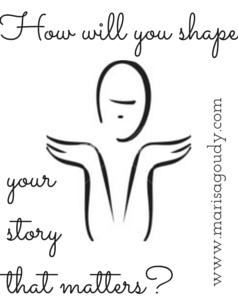 So much of what I have learned about story I have learned from Jeffrey Davis of Tracking Wonder.
So much of what I have learned about story I have learned from Jeffrey Davis of Tracking Wonder.
On the blog this week I describe how working with him on my own fiction empowered me to transform my relationship with creativity and entrepreneurship, and even with my family and my very sense of self.
Last year, I attended his live intensive for authors and now I am helping him spread the word about his six month author’s mentoring program.
Find some details here or, if you are really intrigued, send me an email and I can get you access to the details and the early bird discounts. I'd love to tell you more about my experience and why I truly believe in the magic he brings to the world.
The Entrepreneur’s Guide to Honoring Writing Deadlines - Even During Spring Break
The Sovereign Standard, Issue 9
Sometimes you have the luxury of staring at a blank page. An endless desert of time stretches before you but you can’t think of a single useful thing to say.
For the creative entrepreneur, the opposite is often true: so many ideas, so little time.
Business owning parents in particular know this uncomfortable phenomenon during school breaks - those trying periods when life stops for the kids but everyone else in the professional world is still pushing full speed ahead.
I’m writing this on a coffee table on Cape Cod, relying on the patience of grandparents who’ll play one more game of Candy Land while mama just finishes another paragraph.
The Entrepreneur’s Survival Tools: Writing. Balance. Reciprocity. Self Care.
It’s in the mix of these powerful, sustaining habits that I’ve found my way through this week of delightful disruption and business as unusual.
Writing, balance, reciprocity, and self care overlap and feed one another. I believe that if you honor each in their turn, you have a fighting chance of meeting the end of each day with a sense of “I am enough.”
Writing
Remember, your writing practice is meant to give back to you.
You’ll only sustain the practice and imbue your words with meaning if you’re motivated by something deeper than the dictates of the editorial calendar and the need to churn out one more blog post.
Writing is an opportunity for personal and professional growth. The practice will support you when the world seems to be falling apart due to personal crisis - or simply because the children are hanging about, using the dreaded “b” word. (Is “bored” a four letter word to you too?)
For me, writing is a refuge.
If I didn’t have my writing deadlines, would I carve out any time for myself? Between the great processions to the beach (dressing for the wind takes more time than we actually spend by the water) and the endless task of keeping the toys off my folks’ stairs, it seems impossible even on "vacation."
Truth is, I almost always need “work” as an excuse to step away from my parenting responsibilities. I value self care, but often as an unattainable grail.
Self Care
The goal is to practice self care rather than just celebrate it. I'm still a work in progress in the implementation, but I am great at the research. That’s why I’ve been immersing myself in Koren Motekaitis’s series of podcasts with Jen Louden. I highly recommended a binge listen if you’ve got some long distance driving coming up!
For a quick dose of Jen’s medicine, watch this video on the self care paradox. I love how she describes the need to cultivate a relationship between “savoring and service.”
Because really, as important as the writing and all the other work commitments are, this is a special moment in your family’s life - or it could be. And taking care of work at the cost of your happiness as a mom means you're breaking a fundamental rule of self care.
We still reminisce about that April vacation in Washington DC in 1987. There’s no way my daughter will remember “the spring break mom sat at the computer” since that looks a lot like every other week of her life.
Balance & Reciprocity
Many say that work-life balance is a myth. If your expectation is that you’ll give exactly the same amount of time and energy to business and family and that this will keep everyone happy, it is a myth.
But the goal isn’t making everything 50/50 all the time. The goal is to give and receive in equal measure across the entire continuum of your life.
Lany Sullivan and I explore what reciprocity can really mean in your life and work in a recent Reach Connec Uplift Women interview. So much more than “I scratch your back, you scratch mine” transactions, it is about relationships and self care and connecting based on mutual recognition of worth.
During that conversation we also refer to “ayni,” the Andean concept of sacred reciprocity. Eleanora Amendolara describes ayni in depth so you can embody this profound sense of equilibrium - internally, in relationships, and with the earth itself.
Good Medicine: Writing, Self Care, Reciprocity... and Support
My stepmom kindly recommended I take off my coat and get some work done while she took the kids for a walk.
Clearly I was exuding deadline stress, and I risked infecting everyone around me.
How could I be surprised that I couldn't get clear on my writing and I felt choked with "bad mom" guilt? I wasn't asking for the dedicated creative time I needed and so I was spreading myself too thin as I tried (and failed) to dot it all.
I felt like a fraud, offering advice from and “I’ve got this” pulpit when I was actually just being a terrible, distracted house guest with a couple of needy dependents.
Gratefully, I took that gift of thirty minutes free of mom responsibilities to check back in with my real message, my lived experience, my own imbalance.
I think I found a story worth telling and I drafted a new container to tell it. And then I discovered the space to walk to the beach with my girls - twice.
3 Ways to Honor Your Writing Commitments & Other Deadlines During Times of Delightful Disruption (The Practical Guide)
- Take the pressure off by featuring a guest post on your blog
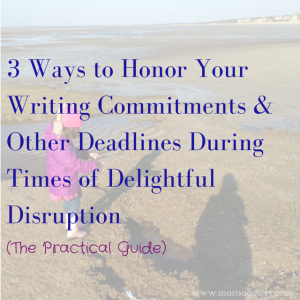 I’m honored to feature Karen Brody’s Exhaustion: It’s Time to Tell a New Story this week.
I’m honored to feature Karen Brody’s Exhaustion: It’s Time to Tell a New Story this week. - Go back to the well: rework and repurpose past posts Because I’ve written posts on reciprocity and self care recently, I worried about insulting you with rehashes of the same topics. Thing is, I didn’t remember exactly what I had written, so how could you? In writing this today I realized how writing, balance, reciprocity, and self care are my signature topics and these explorations are just the beginning. What can you learn about your own work by examining and amplifying material from your archives?
- Keep it simple: think in lists, not in prose This is “do as I say, not as I do” advice today. What was meant to be a quick list of how to keep writing even with kids underfoot ended up becoming much more personal and involved than I had expected. But, if you can enter your next disrupted work week with a perspective on how you’ll integrate writing, self care, balance, and reciprocity, maybe you’ll be able to give yourself permission to write something quick, dirty, and helpful to your readers. After all - if you’re busy with kids underfoot, isn’t there a good chance they’re in the same boat and are also short on reading time?
Bonus Tip for Honoring Your Writing Commitments
Call on your writing coach for extra support. As a writing coach, I’m not a ghost writer who’ll put together a post for you, but I can help you plan your editorial calendar so you’re not working during your vacation. I can also help you implement the ideas in this post so you can develop a writing practice that truly serves you and your business.
Learn more about my writing coaching services.
5 Steps to Reclaiming Your Writing Practice
The Sovereign Standard, Issue 8 
A creative entrepreneur’s editorial calendar can be her salvation. Making a commitment to generate ideas, get the writing done, and put something in front of an audience signals to your community (and your brain and your spirit) that you’re fully invested in this work.
 But, then again, a writing plan can just be a spreadsheet full of punishment and guilt. If you can’t seem to work the plan and meet your deadlines, does it mean you don’t truly care about your business or the people you serve?
But, then again, a writing plan can just be a spreadsheet full of punishment and guilt. If you can’t seem to work the plan and meet your deadlines, does it mean you don’t truly care about your business or the people you serve?
Of course not. But when you’re blinded by the glare of the blank page or find every idea fizzles after two paragraphs, you start to panic. Especially when you’ve been on a consistent publishing streak.
You're thinking nothing short of a natural disaster should stop you from posting on schedule, but here you are, about to fail because you can’t find and stick to one halfway decent topic on an average Tuesday.
Step 1 for Reclaiming Your Writing Practice: Set Your Information Filters
The problem isn’t a lack of ideas. Most likely, it's an overabundance of information and possibility that has you stuck.
So, the first thing to do to vanquish writer’s block is to practice discernment about what sort of information you consume.
In Relax, Their Blogging and Marketing Advice Doesn’t Apply to You I offer a case for why you can tune out what the majority of experts have to say about content marketing - even if you’re dedicated to writing a blog in support of your business.
But then, once you’ve shut off the information fire hose, you’re left with the paradox: now that I finally have some quiet around here, I’m just going to add to the noise.
Step 2 for Reclaiming Your Writing Practice: Believe In the Writing Process
Is the ultimate cure for writer’s block simply killing the urge to write?
What if you convince yourself that producing more articles just adds to the chaos of the oversaturated digital stream? Then you can just walk away from the whole writing enterprise and congratulate yourself for reducing the information glut, right?
No. That’s not right.
There is no greater agony than bearing an untold story inside of you.
- Maya Angelou
Writing is medicine. Words want to make alchemists of us all.
To shape your flashes of insight and prayers of gratitude and revelations of joy into a message that someone else can understand… that is the great prize of the human intellect, the greatest expression of aliveness in this Age of Information.
Writing has saved your sanity more times than you can count, but you forget this. I forget this. And so we research a little more in order to avoid taking the cure that is just as bitter as the disease.
Why is it that when it's time to write we open Google Search instead of opening a Google Doc?
Step 3 for Reclaiming Your Writing Practice: Avoid Writing By Reading About Writing
 Proving that we need writing to sustain us, when I didn't want to write this week, I began to read.
Proving that we need writing to sustain us, when I didn't want to write this week, I began to read.
Writer's block isn't hard to cure. Just write poorly. Continue to write poorly, in public, until you can write better.
He’s right, of course, but the path to success he describes is outlined in traffic cones. Like me, I am betting you were hoping for velvet ropes or a seashell strewn path.
So turn to Kelly Galea who offers the same idea but prepares you a soft writer’s nest with the perfect writing implement and a beloved journal.
Just express yourself. Just BE. So simple, really. Again, are you wondering where these thoughts and words are coming from? This pen. How is that for an answer? The pen is an instrument … YOU are an instrument. Be used to express this collective consciousness in YOUR voice – your unique voice, the voice someone (MANY someones) are waiting to hear, to call them forth, to bring them home. Lead them, guide them, help them, inspire them, teach them. Give them hope. Give them love. Give them that spark. Give them compassion for themselves.
Kelly got me cozy, but I might just burrow into that nest she crafted with her words and never write a thing, so I look to Jeffrey Davis to get me moving.
In Jeffrey’s Post Ecstasy Laundry List he addresses the inevitable come down after a peak creative experience, but much of this advice applies to you if you can’t imagine feeling creative ever again.
He’s telling you to keep writing too:
Make mistakes. The only catastrophic choice a writer makes is not to choose. Whether it’s genre or working story arc or angle. Show up. Get messy. Hit dead ends. Flounder. That’s part of the quest.
Step 4 for Reclaiming Your Writing Practice: Assimilate Rather than Create
I allowed myself one more click before I told myself I would just walk away from the desk and pray for inspiration over the next diaper change (after all, it’s in moments of rest and boredom that the real answers flow).
Then I discovered Karen Brody’s work. Great goodness! She’s an expert in the struggle exhausted, depleted women who inspires you to change your way of being: “Because your life needs you fully charged.”
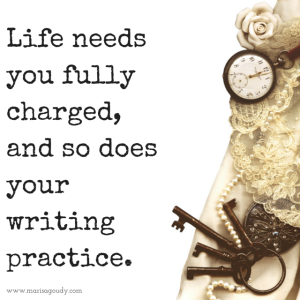 Life needs you fully charged, and so does your writing practice. Addressing writer’s block by staring at the page is like passing someone a Kleenex to cure grief.
Life needs you fully charged, and so does your writing practice. Addressing writer’s block by staring at the page is like passing someone a Kleenex to cure grief.
Karen offers 9 insights into the art of being well-rested, and it's barely a stretch to apply each of these to the “I have no idea what to write” lament. My favorite:
Welcome Everything. Think of all the hours you live in an either/or mentality. Real transformation comes when you can drop the false idea that you’re separate.
Apply this approach to your daily life, welcoming every experience as a potential inspiration for your next blog post or article.
Step 5 for Reclaiming Your Writing Practice: Practice Compassion
Bless you and your commitment. All hail your editorial calendar that can. You keep rocking that publishing streak.
But remember that your writing practice is meant to give back to you.
The hours you put in aren’t just in service to another post, another snack for the voracious internet marketing beast.
Your next post is a distillation of your presence in your life and in your business. It is a message from the heart of your work to the heart of someone who needs your wisdom, encouragement, or strategic advice.
The people who matter - the people who want to be beguiled and convinced and changed by your words - they don’t want you to look at a blank page gone blurry with tears of frustration. If they must, they can wait til next week.
And so can your spreadsheet.
But before you give up and beat yourself up:
- tune out the extraneous noise
- remember why writing matters to you
- seek wise counsel
- be present in the moment, and
- be kind to yourself
I can’t wait to read what you'll write next!
This post was sent to Sovereign Standard subscribers first. To join our community of readers and contributors, please subscribe here.
Why Myth Matters to Your Writing and Marketing
We need myth. We always have, and we always will - if we want to retain our humanity.
Called “a roadmap to the human psyche,” myths exist to explain the big questions like “for what reason was I born?” and “what will happen to me when I die?”
Myths lay out pretty clearly what is on the human smorgasbord: what we want, what we fear, what we would like to have, what we would very much not like to have. Those human fears and human desires really have not changed, and they're reflected in the myths that have been with us for a long time.
--Margaret Atwood
Myths are also indispensable when it comes to less existential matters like creating a Hollywood blockbuster, writing a novel, and assembling a marketing plan.
The Myth that Everyone Knows: The Hero’s Journey
The Hero’s Journey as originally framed by Joseph Campbell is something of a cultural standard these days, particularly for storytellers.
Turns out, “everyone” wasn’t always aware of this great twelve part cycle until Christopher Vogler brought it to Hollywood’s attention in the mid-1980s (at least that’s how he tells it). Of course, it was hiding in plain sight as George Lucas’s Star Wars had already transported us to a galaxy far, far away and transformed movie hero-dom forever. (Later, John Wayne, we've got a farm boy with a character arc!)
Vogler offers great advice on following the Hero framework when crafting a story (this also applies to any attempt to lay your ideas over someone else’s framework):
As with any formula, there are pitfalls to be avoided... The hero myth is a skeleton that should be masked with the details of the individual story, and the structure should not call attention to itself. The order of the hero’s stages as given here is only one of many variations – the stages can be deleted, added to, and drastically re-shuffled without losing any of their power.
The myth is infinitely flexible, capable of endless variation without sacrificing any of its magic, and it will outlive us all.
(While you’re brushing up on the basics of the Hero’s Journey, do check out the summary of the Heroine’s Journey by Maureen Murdock too… I know I’m intrigued.)
The Hero’s Journey through the Marketplace
The hero's story is is a human story that speaks to us on multiple levels. At its best, the Hero’s Journey can connect people with resources that will better their lives. At its most banal, it can be used to make people buy stuff.
First, the “what NOT to do” example.
In Brand Storytelling: 10 Steps to Start Your Content Marketing Hero’s Journey, you’re guided through “The CM Brand Hero’s Journey."
Stop. Right. There.
Develop a marketing and content strategy with you or your brand in the hero’s role and you’ll alienate those who really matter to the story: the people who invest in your work and use it to change their own lives.
The brand is not the hero, just as the writer is not the hero. In case you forgot, Pamela Slim will remind you: It is not about you.
Lest we get sidetracked, deriding those evil marketers who cheapen and co-opt everything, there are clever, useful, sensitive ways to apply this wisdom to business.
Copyblogger’s Brian Clark masterfully re-envisions the role of the brand in the hero's tale: the magical mentor.
The mistake most often made in “marketing” is thinking of your business as the hero, which results in egocentric messages that no one else cares about.
The prospect is always the primary hero, because they are the one going on the journey — whether big or small — to solve a problem or satisfy a desire.
Another reason to tune in to this New Rainmaker podcast: Echoing the cyclical nature of the hero’s journey, you get a new perspective on the funnel: the concentric circles of belief. (If you're excited by the Heroine's Journey this "feminine" diagram of the sales process may really appeal to you.)
A New Mythic Model for the Magical Mentor
Brian Clark employs two of our most beloved mentors to illustrate his point: Obi Wan and Morpheus from The Matrix. You know these guys. You'd trust them if you were chosen to save the world.
Here’s another option that hasn't hit the multiplex: the Sovereignty Goddess.
As I describe in my St. Patrick’s Day post, 5 Lessons on Writing and Entrepreneurship from an Irish Goddess, the Celtic Sovereignty Goddess plays a vital - though fleeting - role in the creation of the hero. She owns her magic and never stresses about playing second fiddle.
“Just” having a supporting role in the hero’s journey is actually what being a storyteller or running a business is all about.
This introduces the paradox of the hero:
We don’t need another hero. Everyone is a hero.
You’re most effective when you realize you’re not the hero of the piece you’re writing or the business you’re running. And yet, you must remember you're the hero of your own story.
The Hero’s Quest: Be of Service
“The hero’s journey is to be of service”: that’s Lisa Engel’s “ah ha” statement at the end of this episode of The Jess, Scott, and You show, “In the Service of Others.” (I had the good fortune to be a guest on this particular show too.)
Though it’s true that it’s not all about you (here, Susie Moore explains why that is such a good thing), you are also on your own quest. You must practice self-care and act from self-love and self-interest in order to grow and meet your potential (we discussed that at length on the show).
You'll never prove your heroism through an egotistical romp aimed showing off your skills and authority. Instead, you become the hero through a willingness to imagine, learn, endure, transform, and then bring the magical elixir home.
Who are your heroes? How have you been called to take on the role of the hero? And what has that taught you about who is really in charge? Leave a comment or tag me with the answer on your favorite social media platform.



